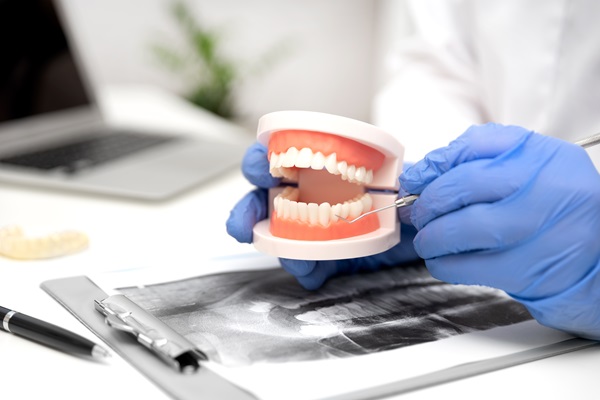How to Prevent Denture Stomatitis

Denture stomatitis can affect patients who wear dentures, bringing uncomfortable symptoms like redness and inflammation. However, there are simple ways to prevent this condition. From consistent oral hygiene to denture relines, patients can wear dentures comfortably and without any issues.
What is denture stomatitis?
Denture stomatitis is a fairly common condition that causes inflammation in the soft tissues beneath a set of dentures, most often on the upper palate. Although the term might sound serious, it usually does not cause pain at first, which is why it often goes unnoticed without routine dental care. It is most often linked to poor denture hygiene or wearing dentures continuously, especially overnight.
Denture stomatitis is not exclusive to older patients and may occur in anyone who wears removable dentures. While it is not considered a serious health issue, it can contribute to discomfort, alter denture fit, and increase the risk of further oral infections if left untreated.
Common symptoms and causes
Denture stomatitis develops gradually and may go unnoticed in its early stages. Some of the most common symptoms include persistent redness under the denture, swelling of the palatal tissue, and, in some cases, small red dots resembling a rash. Although typically not painful, a burning sensation or slight discomfort may occasionally be reported, particularly when consuming hot or spicy foods.
This condition is frequently associated with poor denture hygiene, which allows yeast to thrive beneath the appliance. Constant denture wear creates a warm and moist environment that promotes fungal overgrowth, making it important to take dentures out at night. Ill-fitting dentures that cause friction or pressure points may also compromise tissue health and increase susceptibility to inflammation. Additional risk factors include dry mouth, smoking, nutritional deficiencies, and systemic conditions such as diabetes, which can weaken immune responses and create an environment more prone to oral infections.
Medications that reduce saliva flow can exacerbate the risk. The same is true if a patient uses dentures without regular relining or adjustments. Even when dentures appear clean, microscopic biofilm can accumulate on them over time, leading to microbial imbalance.
Preventing denture stomatitis
Maintaining a clean oral environment and properly caring for dentures are the most effective ways to prevent denture stomatitis. These actions also help extend the lifespan and comfort of the denture itself. Here are five oral and denture care tips that can help reduce the risk of denture stomatitis:
- Clean dentures daily with a soft brush and non-abrasive cleanser — avoid using regular toothpaste
- Remove dentures at night to let oral tissues rest and stay healthy
- Rinse dentures after eating to clear food debris and reduce plaque buildup
- Soak dentures overnight in a denture-cleaning solution or clean water
- Stay hydrated to flush bacteria out of the mouth and, if needed, address symptoms of dry mouth
It is also important to visit the dentist regularly for checkups and cleanings. They can discuss when it is time to replace or reline dentures, such as if they become loose or cause pressure points. Not only are properly fitting dentures more comfortable, but they lower the chances of developing denture stomatitis.
Learn more about how to prevent denture stomatitis
With the right care and habits, denture stomatitis is easily preventable. A dentist can provide additional, more detailed prevention tips during an appointment. Contact our North Attleborough office today to schedule an appointment.
Request an appointment here: https://www.508dentist.com or call 508 Dentist at (508) 301-9909 for an appointment in our North Attleborough office.
Check out what others are saying about our dental services on Yelp: Dentures and Partial Dentures in North Attleborough, MA.
Related Posts
If you have partial dentures, you know how important it is to take good care of them. Repairs can be costly and sometimes damaged dentures may require a total replacement. When it comes to partial dentures, there are many parts prone to breaking, including the teeth, clasps, acrylic plastic base and any metal pieces. When…
People with missing teeth can benefit from getting implant supported dentures. These appliances can help improve smiles and oral health. Some people often find them to be more comfortable compared to conventional dentures. But after getting them, it is crucial for people to do all they can to promote healing. Following the dentist's instructions very…
A dental bridge replaces one or more missing teeth by anchoring a lifelike “pontic” to neighboring teeth or implants. This fixed option restores chewing, speech clarity, and a natural-looking smile line. By filling the space, a dental bridge helps prevent drifting teeth, changes in bite, and excessive wear on remaining enamel. The material, whether porcelain…
Complications after a tooth extraction are uncommon, but understanding the warning signs helps protect long-term oral health. During healing, problems such as infection, dry socket, or prolonged bleeding can occasionally develop. Knowing what to watch for and when to call a dentist supports a smoother recovery. Below are a few things to watch for after…
